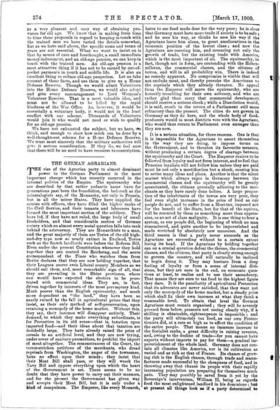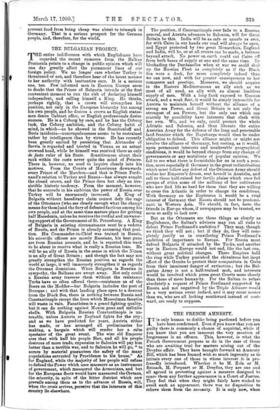THE GERMAN AGRARIANS. T HE rise of the Agrarian party to
almost dominant power in the German Parliament is the most important change which has recently occurred in the internal politics of the Empire. The squirearchy who are described by that rather pedantic name have for generations past been the foundation, the bed-rock as the mineralogists say, of the Monarchy, not only in Prussia, but in all the minor States. They have supplied the armies with officers, they have filled the higher ranks of the Civil Service, and their tenants and labourers have formed the most important section of the soldiery. They have led, if they have not ruled, the large body of small freeholders, and that considerable section of German society which on almost every social question falls into rank behind the aristocracy. They are Monarchists to a man, and the great majority of them are Tories of the old high- and-dry type now so nearly extinct in England, Tories such as the Scotch landlords were before the Reform Bilk Even under the present Constitution whenever they hold together they can control the Reichstag, and the acute correspondent of the Times who watches them from Berlin declares that they are now holding together, that their Leagues coerce even Liberal county Members as we should call them, and, most remarkable sign of all, that they are prevailing in the Rhine provinces, where one would have expected the electors to be pene- trated with commercial ideas. They are, in fact, driven together by interests of the most peremptory kind. Much poorer than the English squirearchy, and much more dependent on "the land," they have been so nearly ruined by the fall in agricultural prices that they insist, as their only method of self-preservation, upon retaining a monopoly of the home market. Without this, they say, their incomes will disappear entirely. Their demand, to which they make everything subordinate, is for Protection in its old sense—that is, taxation upon imported food—and their ideas about that taxation are decidedly large. They have already raised the price of cereals to an artificial level, and they are now trying, under cover of sanitary precautions, to prohibit the import of meat altogether. The remonstrances of the Court, the terror-stricken petitions of the merchants, who dread reprisals from Washington, the anger of the townsmen, have no effect upon their minds ; they insist that their Meat Bill shall pass, or they will wreck the Navy Bill and oppose everything upon which the heart of the Government is set. There seems to be no doubt that they have power to carry out their menaces, and for the present the Government has given way and accepts their Meat Bill, but it is only under a kind of compulsion. The Emperor, like every Monarch, hates to see food made dear for the very poor; he is clear that Germany must have more trade if society is to be safe ; and he sees his way, or thinks he sees his way if the Agrarians leave him alone, to great ameliorations in the economic position of the lowest class ; and now the Agrarians are coercing him, and menacing not only the growth of trade, but the existing trade with America, which is the most important of all. The squirearchy, in fact, though not in form, are contending with the Hohen- zollerns, the commercial classes, and the citizens of towns, and will in all probability win. There is indeed no remedy apparent. No compromise is visible that will not exclude meat, and thereby provoke the Americans to the reprisals which they already threaten. No appeal from the Emperor will move the squirearchy, who are honestly trembling for their own solvency, and who are rather glad than sorry that commercial development should receive a serious check ; while a Dissolution would, it is said, result in the return of a Parliament still more refractory than the present. The cities do not govern in Germany as they do here, and the whole body of food. producers would in most districts vote with the Agrarians, who would thus return to Parliament even stronger than they are now.
It is a serious situation, for three reasons. One is that it is impossible for the Agrarians to assert themselves in the way they are doing, to impose terms on the Government, and to threaten its favourite measure, without producing a certain degree of cleavage between the squirearchy and the Court. The Emperor desires to be followed from loyalty and not from interest, and to feel that Prussian loyalists will not follow him unless they are paid must be not only a mortification but a shock, causing him to revise many ideas and plans. Another is that the silent contest which always rages in Germany between the commercial classes and the squirearchy will be greatly accentuated, the citizens generally adhering to the mer- chants as they have rarely done before. A large propor- tion of the inhabitants of the towns are very poor, they feel even slight increases in the price of food as our people do not, and to suffer from a Meat-tax, imposed not for the benefit of the State, but for that of the squires, will be resented by them as something more than oppres- sion, as an act of class malignity. It is one thing to bear a system, as our people did, the beginning of which no man remembered, and quite another to be impoverished and made wretched by absolutely new measures. And the third reason is that a party never succeeds as the Agrarians are succeeding without to a certain extent losing its head. If the Agrarians by holding together can on a crucial question defeat the throne, the commercial classes, and the citizens, that party is clearly strong enough to govern the country, and will naturally be inclined to begin doing it. They may hesitate from a deep feeling of loyalty or from a sense of internal divi- sions, but they are sure in the end, on economic ques- tions at least, to realise and to use their ascendency. That means they are sure to tax food to the highest figure they dare. It is the peculiarity of agricultural Protection that its advocates are never satisfied, that they want not only the monopoly of the home market, but a steady price which shall fix their own incomes at what they think a reasonable level. To obtain that level the German Agrarians must remain organised ; they will be severely pressed from below, peasants not seeing clearly why, if a shilling is obtainable, eighteenpence is impossible ; and the party will ultimately tax food, as our own Protec- tionists did, at a rate so high as to affect the condition of the entire people. That means an immense increase to the Socialist ranks, a great difficulty in raising revenue, and, owing to the decline of trade—for you cannot have exports without imports to pay for them—a gradual im- poverishment of the whole land. Germany does not con- tain all climates like America, nor is its cultivation as varied and as rich as that of France. Its chance of grow- ing rich is the English chance, through trade and manu- factures made successful by the cheapness of food, and in throwing away that chance its people with their rapidly increasing population are preparing for themselves much pain. They may possibly be saved from it yet by the Sovereign's intervention, William IL being as regards food the most enlightened landlord in his dominions ; but at present all things look as if a party determined to prevent food from being cheap was about to triumph in Germany. That is a serious prospect for the German people, and, therefore, for the world.

































 Previous page
Previous page